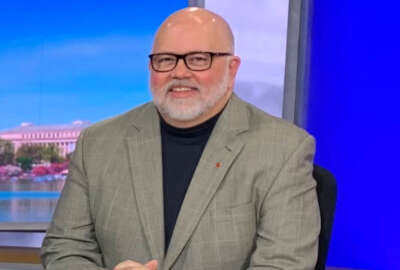Dedicated civil servants, or an out of control ‘deep state?’
Jeff Neal writes that the more civil servants see attacks by political appointees and politicians on their skills, work, integrity and even their patriotism, th...
Proposals to eviscerate the civil service via “Schedule F” and the “Public Service Reform Act” are just the latest from the people who believe civil servants are, at best, out of control bureaucrats, or even worse, a devious “deep state” that undermines the policies of the president of the United States.
Is what they argue supported by facts? Or is their argument more about being able to carry out ill-conceived and possibly illegal actions that undermine the effectiveness of the government of the United States? Much of this type of argument seems to say that the president can do whatever he wants, and the “bureaucrats” or “deep state” get in the way. One recent article highlighted the belief of some appointees who had served in both the Trump and Bush administrations that career civil servants had been far less cooperative with the Trump administration, and the idea that civil servants are more liberal than the country as a whole. They attribute perceived unwillingness to move Trump administration priorities quickly to this alleged liberal bias. Was the reason that they are a “deep state” or that there were significant differences in how the Bush and Trump administrations operated with respect to policy? President George W. Bush was a conservative and pursued conservative policies, but he did not ignore the legal and regulatory requirements for carrying out those policies. Perhaps that is the reason for the differences in how the two administrations experienced the civil service.
It is most likely true that government workers tend to be more progressive in their politics. This leftward tilt is more a factor of levels of education than anything else. Data from Pew Research shows that more educated people tend to be more liberal in their beliefs. Government workers are generally on the higher end of the education spectrum. The reality is that many factors come into play when looking at how the civil service responds to political leaders. Let’s take a look at a few of those.
First, the civil service is not a monolith. There are 2 million civil servants and some are very liberal and others are very conservative. Most are probably somewhere in the middle. They do have a different perspective on government, simply because they work in it every day. They know what government can and cannot do, because they live it and they understand the law, rules and regulations that govern their work.
Complaints about the civil service come from appointees of both parties. I have heard complaints from both Republican and Democratic appointees who thought the career workforce did not move quickly enough to implement their programs. Given the short tenure of most political appointees, it is not unusual that they have a sense of urgency about getting their agenda completed. Appointees from both parties typically come to the decision that the career staff were helpful and regret they did not embrace them and rely on them sooner. The Trump administration was more of an outlier in this regard.
Second, there are many reasons that programs do not move as fast as the political appointees want them to move. Many times it is simply the need to ensure that proposals are legal, that statutory and regulatory requirements, such as the Administrative Procedures Act,) are met, and that the complex interagency work that often needs to be done is completed. Those things take time, and sometimes the answer is that what the appointee wants done cannot happen. A good example is the Trump administration’s move to rescind the Deferred Action for Childhood Arrivals (DACA) program implemented by the Obama administration. When the Supreme Court ruled that the decision did not pass the “arbitrary-and-capricious” test in Administrative Procedures Act, Chief Justice Roberts wrote, “The Executive Branch explained its decision to rescind DACA in two sequential memorandums by successive Secretaries of Homeland Security: the 2017 Duke Memorandum and the 2018 Nielsen Memorandum. The Duke Memorandum focused on DACA’s perceived legal flaws. The Court today finds the Duke Memorandum insufficient under the APA’s arbitrary-and-capricious standard.”
The decision also said, “The rule requiring a new decision before considering new reasons is not merely a formality. It serves important administrative law values by promoting agency accountability to the public, instilling confidence that the reasons given are not simply convenient litigating positions, and facilitating orderly review. Each of these values would be markedly undermined if this Court allowed DHS to rely on reasons offered nine months after the rescission and after three different courts had identified flaws in the original explanation.” Those words came from a conservative Republican chief justice.
Many observers noted that the Trump administration was not particularly adept at administrative law. In this case and multiple others, courts decided that the administration cited inaccurate or misleading reasons for policies, or simply did not follow the rules. Had they followed the rules, they could have done far more of what they wanted.
A third issue is that neither presidents nor their appointees are kings and queens. They do not own the government. The president takes an oath of office specified in the Constitution. Appointees take an oath of office where they swear “I will support and defend the Constitution of the United States against all enemies, foreign and domestic; that I will bear true faith and allegiance to the same; that I take this obligation freely, without any mental reservation or purpose of evasion; and that I will well and faithfully discharge the duties of the office on which I am about to enter. So help me God.” Civil servants do not swear that they will do anything the president or a political appointee wants them to do. Their first obligation is to the Constitution. Presidents and political appointees are temporary custodians of the government. It was there before they arrived and it has to be there when they leave. When an appointee wants to undermine the mission that is established in the enabling legislation for an agency, civil servants often resist doing that, and work to convince the political leaders that other courses of action would be more consistent with the mission and with the governing law and regulations. Is that being a bureaucrat? Or a “deep state operative?” No. it is carrying out their oath of office. Those oaths are not meaningless words that are a mere formality to getting the job. They are far more than a ministerial detail. They are exactly what they say they are – an oath before God to protect and defend the Constitution of this great nation. I have taken that oath multiple times, and every time I have been struck by the words and their profound meaning.
The bottom line is that our government is large and complex. It is a government of laws, charged with delivering vital services to the American people, who rely on civil servants to support our military, defend our borders, pay Social Security, veterans’ health care, and other benefits for recipients. They provide impartial numbers regarding the health of our economy, the number of people in the country, and other vital data that decide where billions of dollars of taxpayer money are spent. Countries around the world have learned that a professional civil service is essential for an effective government. A politicized civil service where every new administration throws out thousands of people just because they are not from their party is the opposite of a qualified, professional civil service.
The credibility of government agencies is the product of decades of work by millions of dedicated civil servants. Their professional expertise is vital to accomplishing the mission of every federal agency. It may have taken years to build that credibility, but rash and politically motivated decisions can kill it quickly. No President, whether republican or democrat, has the right to trash the government. Certainly no temporary political appointee has the right to do that. They are there as stewards of the people’s government, just as civil servants are stewards.
I have been both a career employee and a political appointee. I have supported Republicans and Democrats in carrying out their policies. I have advised both when they were about to do something stupid, and when they wanted to do something that we simply could not do because of the law. As a political appointee I listened and followed his advice when a career executive told me was about to do something that was not an appropriate action for a political appointee to take. Like many other appointees, I appreciated that advice and the perspective from which it came.
The “deep state” is a sinister sounding concept that is intended to create fear or rage, or both. It also does not exist. The “unaccountable bureaucrat” also does not exist. Every civil servant is accountable for their work and conduct. I have been in multiple situations where civil servants were not doing their jobs. They were fired or moved to jobs that suited their qualifications. It does not take years to deal with poor performance, but it does take some backbone. It also takes some backbone to tell your political boss that s/he is about to violate the law and that you will not help them do it.
The vast majority of the 2 million federal workers do their jobs. They are not extreme partisans, and they are good at what they do. Even if they have strong political beliefs, they carry out the lawful orders of their political bosses. The more we see these attacks on their skills, their work, their integrity, and even their patriotism, the more likely it is that they will not stay and that it will be even harder to find qualified replacements. Those who favor a smaller government may think that is a great idea, but imagine what happens when they cannot staff the Departments of Defense and Homeland Security and Veterans Affairs? Do they think millions of veterans will be happy when they cannot get the benefits they earned? Do they think a warfighter who does not have the supplies s/he needs because the Defense Logistics Agency could not hire qualified people gives a damn about their political concerns? Most of what the government does is not political and is not something the American people want to see broken. These proposals to break the career civil service are driven by political objectives and not by the needs of the government and the people it serves.
Rather than gutting the career civil service and returning to a spoils system, we should focus on improving the civil service through simplified hiring and pay practices. We can also improve accountability and make it more clear that performance and conduct issues can be solved. That type of change will serve the American people and it is what we need today.
Jeff Neal authors the blog ChiefHRO.com and was previously the chief human capital officer at the Department of Homeland Security and the chief human resources officer at the Defense Logistics Agency.
Copyright © 2024 Federal News Network. All rights reserved. This website is not intended for users located within the European Economic Area.





